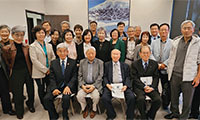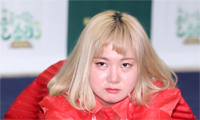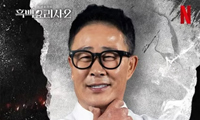▶ Los Angeles Survival (32)
Copyright 2001
The Census Bureau released its Year 2000 report. Asians in California - and Koreans are listed as Asians - are now 13% of the state population and the third-largest in population. The Los Angeles Times (3/30/01) study added, "Demographers believe the majority of Asian population growth is now driven by birth, rather than immigration." Also noted, "The wide gap between rich and poor Asians identified in the 1990 census remains. A 50.5% majority of San Marino residents now report Asian ancestry, and the Asian population has exploded in affluent areas such as Arcadia, Diamond Bar and Rowland Heights. Meanwhile, large pockets of poverty remain in places like Los Angeles Chinatown, South El Monte and Long Beach’s Little Pnom Penh."
No mention of Koreatown which had its start in the early 1960s. That was when Koreans flew into LAX. They did not come steerage class in ships that took two weeks to cross the Pacific. They came like everyone else, passengers in modern airlines, and they were immigrants. They did not look like the traditional history-book immigrants, bundled up, their worldly goods bundled up too, hand-carried for lack of baggage service. No, they were the new immigrants in America, heads held high knowing what they wanted, knowing the magic words "open sesame" that would make their dream come true, would make everything right. Even problems and headaches they’d left at home in Korea.
Among their numbers was Myung Park (not her correct name) arriving with her husband. Mr. Park was investing in a store in the Long Beach area. He secured the business through a Korean entrepreneur he trusted, and the store proved everything the man said it would. It was a gold mine, much like the gold mines early immigrants 100 years before sought in the Golden State. It was a variety store selling Japanese-made products Americans missed during the war years. Korean products came later and cost more. The best seller was the sandal or rubber thongs (rubber tires recycled from America) called "go-aheads", plus the usual assortment sold before World War II: teapots, dishes, trinkets, knicknacks, silk scarves, pictures, and so on and on. Another feature was the owner could manage by himself and save on wages. And what was his wife planning?
She planned to become a licensed beauty shop owner. In Korea she worked at many service jobs to supplement the family income. Her education was limited. She preferred the work in the beauty salons that made women pretty, sometimes beautiful, but she never rose above that of a helper washing customers’ hair and helping them in and out of their dresses. She couldn’t afford to get her license to advance herself. Now she was in America and was married to a husband who could give her a year at a beauty college.
She found her shop, after working getting experience in other Korean workplaces. It was located on Vermont Avenue, near Franklin, and first opened by a Korean who named it after herself, "Sunny’s Beauty Salon". Sunny was a young person and beautiful. Her customers were middle-aged, middle-class Americans who probably shuddered inwardly looking upon her youthfulness. Sunny did not smile much, in fact her moods clearly showed on her face. And American ladies like a pleasant smile from those serving them. Sunny looked withdrawn most of the time, and small wonder. She was not making the rent money on the lease. The ladies came infrequently. Also, "the flower children" and the hippies invaded Hollywood and older persons avoided them, swarming the streets of Hollywood as the hippies were doing. Hollywood wasn’t the same. What was once an American neighborhood became mixed (multicultural, is the expression today), and only Quinns, a health store, and Sarno, an Italian bakery and restaurant, remained. Sunny sold out to Myung Park, with its few American customers and, oddly, Korean ladies were showing up too. No doubt to brush up their Korean! I was one of Sunny’s few customers, leftover as it were. And spoke no Korean. Fortunately, Myung was speaking English like an American born. She was adapting to her new country, so what was it like for her in Korea, I asked.
She replied while she worked, in bits, between hairsetting, shampooing, combing out and taking the money from the customers. No wonder, I thought, Koreans were getting ahead in every way. There was a Mrs. Yang who ran a coffee shop near the library I went to. Her English was understandable, but halting. The coffee shop was not prospering, perhaps because of its location but thinking a little more I knew it had to do with personality. Myung made her customers feel important, her service made us feel better about ourselves. Mrs. Yang’s cooking did not do that. It was poor fare albeit very cheap, and did not lift the spirit. Mrs. Yang probably worked hard, and had long hours too, but she was dissatisfied with her coffee shop. She once remarked - the friend I was with lived on the Westside, near Beverly Hills - enviously, "One day my husband and I live in Los Feliz area. Very expensive." Mrs. Yang was a dreamer; I know, I am one too.
Myung’s replies, given in bits, grew into a full story over time. She had been married before in Korea and the household was made up, beside the couple, with a son and the husband’s mother. There was a brother who was a Catholic priest, who kept in close touch with the family, being devoted to his mother and his brother. Their marriage began to fall apart, and she did not know the reason, except he accused her of causing friction between him and the son, and between him and his mother. Neither one thought of separation or divorce and the marriage crumbled along until one day he demanded she leave the house: He could no longer take the friction she was causing. His mother, who had been like a mother to her, cried and pleaded with him to reconsider, pointing out Myung worked such long hours and was in no position to cause friction between them. His cold answer was, "Do you want to leave with her?" Myung thought quickly, Who would take care of the seven-year-old boy? And left and found help from the Christian church congregation who was interested in the rights of Korean women, of which she had no thoughts about. Korean women were rulers in the home, what more did they want, she wondered even today. She was helped with her divorce and so her husband remarried. There were children by the new wife. Her mother-in-law wrote her infrequently, and for the purpose of informing her about her son. Myung said Korean law gave absolute control to the father over his children in a divorce settlement, whether the mother could see them or not. And he had chosen to refuse. She had not seen her son in eight years. Her next project, now the shop was underway and she found a temporary licensed operator, was to make a trip to Korea. She felt she needed to see the mother-in-law again. At the same time she would beg her former husband to allow her to meet with the son. "Is that too much to ask?" she said. The brother-priest came through Los Angeles just then, and mentioned his mother was not well, she was getting old. Myung told him about seeing her son. He shook his head, "He is no longer your son. But see our mother, she longs to see you." And he was off on Church business.
The trip to Korea was a short one and Myung did not return as if she had had a vacation. She said it was as her brother-in-law priest had said: The mother-in-law was growing old. Also Myung did not meet the new family; she saw her former husband to ask him the favor she had come for and he refused. However, he made a concession. She could see her son from a distance if she obeyed his directions. She agreed. He took her to a restaurant the high school students frequented and seated her, warning her to make no move that would draw the son’s attention or utter a noise that would attract his notice. She agreed again. She could see the entrance and did not taste the food placed in front of her, her eyes anxiously on the door. And knew the son the moment he came through, and almost called out, almost rose to face him, and sat back instead and watched him eat his lunch and talk with his friends and walk out with them. She looked at her former husband, whose face was bland, with no emotion showing, in withdrawal from what was taking place. She got up from the table and said she would see her way out. She was not to see him again.
From there she visited with her mother-in-law for the last time, too. She was going to the hotel and pack her bag and take a flight back to America, she told the old woman. What could she say to the old woman? It was nice knowing you? She took the older woman in her arms and together the two cried, the mother-in-law gasping out, "His wife wants him-my son-to get rid of me. She says I am a burden to her, I no longer help." Desolate words! DesolationEMyung was a simple person and prayed the woman’s Catholic son’s prayer for them both, "Grant me the serenity to accept the things I cannot changeE" and the women parted.
When she got back, she told the customers happily that her husband’s business was so good, he was expanding and he was asking her to become full partners with him. She was selling the beauty shop. Her happiness about the move infected us all, and we cheered even though we were not sure if ever anyone would make us so pretty again. The new owner proved an excellent beauty operator because we continued to look well groomed. And she was also an acquaintance of Myung and kept us informed about her fortunes. So life went along when one day the hairdresser told what Myung had reported to her about the family in Korea. Myung wanted some of us to know, because prayers were said for them.
It was that Myung’s mother-in-law committed suicide. Her son with whom she lived, collapsed on hearing the news and was hospitalized and had not recovered from the blow. He was pronounced mentally ill. Myung’s son was taken in charge by the Catholic priest, the boy’s uncle, and was in a private school. The wife and children were with her parents. How bare these words writing an ending to so many lives involved together.
It is like reading Census Bureau report 2000.
Editor’s note- This column by Korean American writer Ellen Thun is about her experience of growing in Los Angeles before World War II. The story sheds light on a life of first-wave Korean immigrants in the early part of 1900s. Writer Thun was born in Riverside and went to grammar school in Riverside and high school and college in Los Angeles, and worked as a proofreader at the Times-Mirror Press, Los Angeles.
스마터리빙
more [ 건강]
[ 건강]이제 혈관 건강도 챙기자!
[현대해운]우리 눈에 보이지 않기 때문에 혈관 건강을 챙기는 것은 결코 쉽지 않은데요. 여러분은 혈관 건강을 유지하기 위해 어떤 노력을 하시나요?
 [ 건강]
[ 건강]내 몸이 건강해지는 과일궁합
 [ 라이프]
[ 라이프]벌레야 물럿거라! 천연 해충제 만들기
 [ 건강]
[ 건강]혈압 낮추는데 좋은 식품
[현대해운]혈관 건강은 주로 노화가 진행되면서 지켜야 할 문제라고 인식되어 왔습니다. 최근 생활 패턴과 식생활의 변화로 혈관의 노화 진행이 빨라지고
사람·사람들
more많이 본 기사
- 그린란드 들쑤셔놓고…트럼프, 가족과 대학미식축구 관람
- “페널티 없이 401(k)로 주택 다운페이”
- ‘값비싼 이혼’ 위협하는 트럼프에…프·독은 강경·영국은 신중
- 트럼프 위협에 10조달러 미국 자산 무기화?…유럽의 딜레마
- 시위대, 이민단속 앞장선 목사에 항의… 1
- 아프리카 무관세 美수출길 다시 열리나…하원 연장안 가결
- 이혜훈 청문회 ‘일단’ 불발할 듯…靑 재송부 요청 여부 주목
- 차 고장나 하루더 묵었다가…美관광객 3명 ‘묻지마’ 총격에 사망
- 올해 연방 학자금 대출 전면 개편… 한도 큰 폭 축소
- 텍사스 ICE 이민자 구금시설서 세번째 사망자 발생
- 종합특검법 국무회의 통과…최대 251명 투입해 최장 170일 수사
- 뉴욕증권거래소, 토큰증권 거래 플랫폼 추진…24시간 주식거래
- 장동혁 ‘쌍특검 단식’ 엿새째… “민… 2
- “숨 막혀서 도저히 못 타겠다”… ‘닭장 좌석 논란’ 항공사, 승객 비난에 결국
- ‘엔비디아, 연말 시총 7조달러 돌파’
- “혼자가 얼마나 좋은데 연애를 왜 해요?”…큰소리친 사람들 나이 들더니
- 마이크론, 대만 반도체공장 18억달러에 인수나서…”메모리 수요 대응”
- 또 ICE 이민 급습 단속… 자바시장 ‘공포 분위기’
- 우드랜드 동물원 사자 쌍둥이 태어나...남아공 사자 2014년 이후 10여년만에 첫 출산 ‘기쁨’
- ‘영화 속 미래가 현실로’… CES 2026 주목할 신제품
- 시혹스, LA램스와 사실상 슈퍼볼...25일 오후 3시30분 시애틀 루멘필드서 NFC챔피언 결정전
- “내 계좌로 받으라 했다”..박나래·전 매니저, 이번엔 횡령 의혹 ‘진흙탕 공방’
- 류시원, ‘19살 연하’ 강사 ♥아내 공개 “예쁜데 공부까지 잘해”
- 박나래 매니저, 행사비 횡령 의혹..3000만원 행방은?
- 워싱턴주, 비지니스 시작하기에 ‘전국 하위권’...미 50개주 중 38위로 안좋아… 결국 “비즈니스에 불리한 주”
- 롱뷰한인장로교회 담임에 윤응렬 목사...오리건주 포틀랜드 소망한인장로교회 담임 역임
- 페더럴웨이한인회, 17년 만에 한식구됐다...서북미연합회 임시총회서 만장일치로 회원 가입 의결
- 무언의 시위?…퇴출압박 연준의장, ‘동병상련’ 연준이사 재판 참석
- 머스크, 또 선거 ‘큰손’ 역할…공화 경선후보에 150억원 기부
- 스페인 열차참사 사망자 40명…사고원인 조사 착수
- LA 집값 ‘기본이 100만불’… 밸리·토랜스 등 15곳 늘어
- 기독실업인협회 시애틀지회장에 최명희씨...CBMC 서북부연합회 신년 모임서 최 지회장 취임식 가져
- 트럼프, 맘다니 뉴욕시장에 “텍사스 증권거래소로 큰 시험대”
- 반복되는 일가족 살해 ‘비극’… 3명 사망
- 가족이민 전부문 3개월째 제자리
- 신차 구매자 월 할부금 1천달러 훌쩍… 구입 시 고려할 점
- Another ICE Immigration Raid Hits LA Fashion District... ‘Atmosphere of Fear’ Grips Jabba Market
- 거의 비슷해진 한미 시장금리…그래도 오르는 환율, 왜?
- 12월 전국 고용 5만명 증가에 그쳐 부진
- 시애틀 주택시장, 구입자엔 ‘최고 좋은 시기’...매물은 늘고 거래는 둔화…조건 맞으면 수년 만의 매수 기회
- 트럼프 “노벨상 나한테 안줘서…그린란드 통제할 것”
- 임성근, ‘음주운전 3번’ 고백 직격타..구독자 3만명 줄줄이 이탈
- ‘1억 공천헌금’ 강선우 경찰 출석…”원칙 지키는 삶 살아와”
- 트럼프, ‘그린란드 관세’ “100% 실행”…무력옵션은 “노코멘트”
- 서울대 남가주 총동창회 이사회
- 무역대표, ‘상호관세’ 대법 패소시 대체관세 도입 “즉시 착수”
- 지정학적 일대 재난사태로…
- “살아있는 권력 근처로 가자”
- 이민성호, U-23 아시안컵 4강 ‘한일전’ 성사
- [메건 매카들 칼럼] 보고 싶은 것만 보기
1/5지식톡

-
 한국 안경을 무료 배송으로 받아보실…
0
한국 안경을 무료 배송으로 받아보실…
0안녕하세요. 서울 안암동에 위치한 ‘보고싶다 안경원’입니다.저희는 다년간 한국 고객분들께 착용감 좋은 안경테와 한국안경브랜드,고압축 도수 렌즈를 합리적인 가격에 제공해온 안경 전문점입니다.이번에 해외 배송이 가능해…
-
 미 육군 사관학교 West Poin…
0
미 육군 사관학교 West Poin…
0https://youtu.be/SxD8cEhNV6Q연락처:wpkapca@gmail.comJohn Choi: 714-716-6414West Point 합격증을 받으셨나요?미 육군사관학교 West Point 학부모 모…
-
 ☝️해외에서도 가능한 한국어 선생님…
0
☝️해외에서도 가능한 한국어 선생님…
0이 영상 하나면 충분합니다!♥️상담신청문의♥️☝️ 문의 폭주로 '선착순 상담'만 진행합니다.☎️ : 02-6213-9094✨카카오톡ID : @GOODEDU77 (@골뱅이 꼭 붙여주셔야합니다…
-
 테슬라 자동차 시트커버 장착
0
테슬라 자동차 시트커버 장착
0테슬라 시트커버, 사놓고 아직 못 씌우셨죠?장착이 생각보다 쉽지 않습니다.20년 경력 전문가에게 맡기세요 — 깔끔하고 딱 맞게 장착해드립니다!장착비용:앞좌석: $40뒷좌석: $60앞·뒷좌석 …
-
 식당용 부탄가스
0
식당용 부탄가스
0식당용 부탄가스 홀세일 합니다 로스앤젤레스 다운타운 픽업 가능 안녕 하세요?강아지 & 고양이 모든 애완동물 / 반려동물 식품 & 모든 애완동물/반려동물 관련 제품들 전문적으로 홀세일/취급하는 회사 입니다 100% …
케이타운 1번가
오피니언
 옥세철 논설위원
옥세철 논설위원지정학적 일대 재난사태로…
 메건 매카들 워싱턴포스트 칼럼니스트
메건 매카들 워싱턴포스트 칼럼니스트 [메건 매카들 칼럼] 보고 싶은 것만 보기
 박소정 더 트리니티 대표 한국공공외교학회 문화외교 이사
박소정 더 트리니티 대표 한국공공외교학회 문화외교 이사 [박소정의 아트 비즈니스] AI와 예술
 조형숙 시인·수필가 미주문협 총무이사
조형숙 시인·수필가 미주문협 총무이사 잃어버린 것의 자리에서
 민병권 / 서울경제 논설위원
민병권 / 서울경제 논설위원[만화경] 안동 사과와 한일 정상회담

한인 2세들 ‘족쇄’ 국적법 신속 개정해야

노동법 준수로 공정의 새해 열자
 조지 F·윌 워싱턴포스트 칼럼니스트
조지 F·윌 워싱턴포스트 칼럼니스트 [조지 F. 윌 칼럼] 올 중간선거를 덜 불쾌하게 만드는 길
 최규성 삼성서울병원 이식외과 교수
최규성 삼성서울병원 이식외과 교수 [로터리] ‘토의 간’
1/3지사별 뉴스

뉴욕한인회‘제123주년 미주한인의 날’ 기념식 성황
뉴욕한인회(회장 이명석)가 13일 맨하탄 뉴욕한인회관에서 개최한‘제123주년 미주한인의 날’ 기념 행사가 각계에서 활동 중인 1.5세 및 2세…
국적이탈 수속에 2년이나 걸리다니⋯

“살아있는 권력 근처로 가자”
도널드 트럼프 대통령이 집권한 이후 전세계 억만장자들이 잇달아 워싱턴 지역으로 몰리고 있는 것으로 알려졌다.언론매체인 파이낸셜 타임즈는 최근 …
“실질적 삶의 문제에 최우선”

미네소타 또 긴장 고조…육군 투입 대기에 주방위군 동원령
이민세관단속국(ICE) 요원의 총격 사건을 계기로 격렬한 시위가 계속되는 미네소타주에서 긴장이 더 고조되고 있다.국방부가 알래스카에 주둔 중인…
재미한국학교협의회

오늘 하루 이 창 열지 않음 닫기 



















































.png)


댓글 안에 당신의 성숙함도 담아 주세요.
'오늘의 한마디'는 기사에 대하여 자신의 생각을 말하고 남의 생각을 들으며 서로 다양한 의견을 나누는 공간입니다. 그러나 간혹 불건전한 내용을 올리시는 분들이 계셔서 건전한 인터넷문화 정착을 위해 아래와 같은 운영원칙을 적용합니다.
자체 모니터링을 통해 아래에 해당하는 내용이 포함된 댓글이 발견되면 예고없이 삭제 조치를 하겠습니다.
불건전한 댓글을 올리거나, 이름에 비속어 및 상대방의 불쾌감을 주는 단어를 사용, 유명인 또는 특정 일반인을 사칭하는 경우 이용에 대한 차단 제재를 받을 수 있습니다. 차단될 경우, 일주일간 댓글을 달수 없게 됩니다.
명예훼손, 개인정보 유출, 욕설 등 법률에 위반되는 댓글은 관계 법령에 의거 민형사상 처벌을 받을 수 있으니 이용에 주의를 부탁드립니다.
Close
x